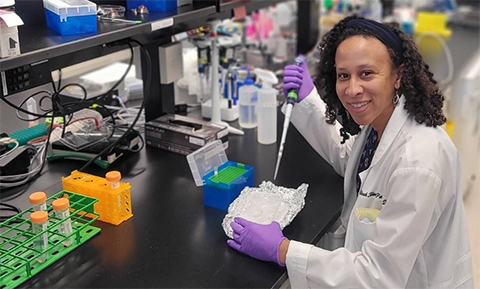A shift from parasites to immune cells
When Aleah Roberts was in the 6th grade in Manassas, Virginia, a teacher assigned her to design a cake with the features of a plant cell. She’s been interested in biology ever since.
At the University of Virginia, where Roberts earned her undergraduate degree in engineering science, she took a class on the biology of infectious diseases, and that’s when she became fascinated with microorganisms and immunology.

During her postbaccalaureate studies at the University of Pennsylvania, Roberts started doing biomedical science research. She was interested in parasitic worms, so she looked for research opportunities in parasitology. In the first lab she joined, she studied schistosomes, parasitic flatworms that cause schistosomiasis, which the World Health Organization considers the second-most socioeconomically devastating parasitic disease. In her second lab, she studied the parasitic disease leishmaniasis, which is spread by sand flies and is common in some tropic and subtropic regions. These studies gave her experience in immunoparasitology, which she appreciated.
“It’s a big group of immunoparasitologists at the vet school at UPenn, and I really liked it,” she said.
Because of its large well-known Malaria Research Institute, Roberts decided to pursue graduate work at Johns Hopkins University. There, she studied the molecular parasitology of malaria parasites and earned her Ph.D. in molecular microbiology and immunology.
Now a postdoctoral fellow at the National Heart, Lung, and Blood Institute of the National Institutes of Health, Roberts studies the endocytosis of the B cell receptor into B cells.
“B cells are important because they are the cells in your body that really launch the adaptive immune response,” she said. “They make antibodies … and to become activated to make an antibody, they first have to endocytose the antigen through the B cell receptor.”
Scientists know how small B cell receptors are endocytosed, but they have not yet figured out how the cell takes up larger B cell receptor clusters and processes them to activate the cell. Roberts is studying this process. For her first project, she worked on identifying what physical plasma membrane structures and other unique structures are present at B cell receptor clusters, using an advanced microscopy technique. With this information, she was able to characterize endocytic mechanisms that may be involved. She then went on to study lymphoma cells, which also have large clusters, and found structural similarities.
Roberts has been a participant in the Maximizing Opportunities for Scientific and Academic Independent Careers program since July, and so far, one thing she loves is the mentoring by faculty members around the country. Her one-on-one mentor, whom she’s met with multiple times, has been very supportive. Talking with other members of her cohort about their job searches and science in general also has been helpful.
“Having people outside of your lab look at plans and your experiments has been great because you get a different perspective,” she said.
For her work in the future, Roberts hopes to branch out and merge her multiple research interests.
“I’m hoping to study immune cells and endocytosis of large antigens and link it to disease pathogenesis,” she said, “not just in cancer but also in infectious diseases.”
Enjoy reading ASBMB Today?
Become a member to receive the print edition four times a year and the digital edition monthly.
Learn moreGet the latest from ASBMB Today
Enter your email address, and we’ll send you a weekly email with recent articles, interviews and more.
Latest in People
People highlights or most popular articles

Kiessling wins glycobiology award
She was honored by the Society for Glycobiology for her work on protein–glycan interactions.

2026 ASBMB election results
Meet the new Council members and Nominating Committee member.

Simcox wins SACNAS mentorship award
She was recognized for her sustained excellence in mentorship and was honored at SACNAS’ 2025 National Conference.

From humble beginnings to unlocking lysosomal secrets
Monther Abu–Remaileh will receive the ASBMB’s 2026 Walter A. Shaw Young Investigator Award in Lipid Research at the ASBMB Annual Meeting, March 7-10 in Washington, D.C.

Chemistry meets biology to thwart parasites
Margaret Phillips will receive the Alice and C. C. Wang Award in Molecular Parasitology at the ASBMB Annual Meeting, March 7-10 in Washington, D.C.

ASBMB announces 2026 JBC/Tabor awardees
The seven awardees are first authors of outstanding papers published in 2025 in the Journal of Biological Chemistry.

